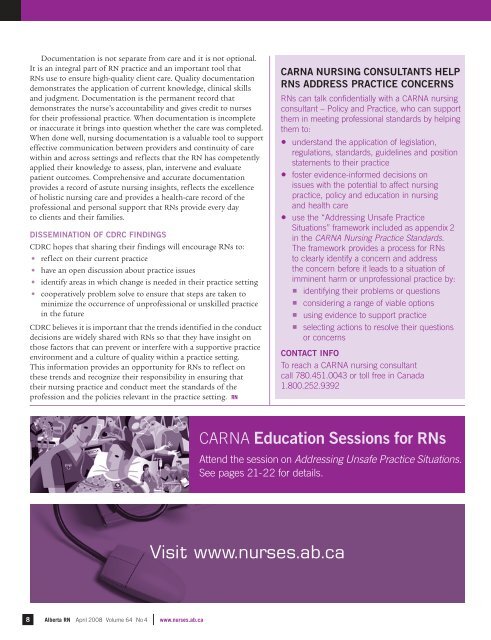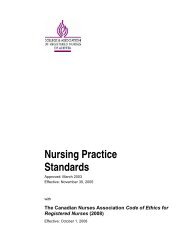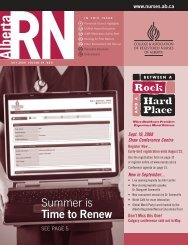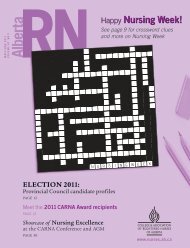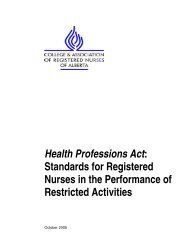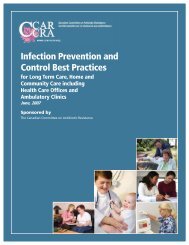I am a nurse. - College & Association of Registered Nurses of Alberta
I am a nurse. - College & Association of Registered Nurses of Alberta
I am a nurse. - College & Association of Registered Nurses of Alberta
Create successful ePaper yourself
Turn your PDF publications into a flip-book with our unique Google optimized e-Paper software.
8<br />
Documentation is not separate from care and it is not optional.<br />
It is an integral part <strong>of</strong> RN practice and an important tool that<br />
RNs use to ensure high-quality client care. Quality documentation<br />
demonstrates the application <strong>of</strong> current knowledge, clinical skills<br />
and judgment. Documentation is the permanent record that<br />
demonstrates the <strong>nurse</strong>’s accountability and gives credit to <strong>nurse</strong>s<br />
for their pr<strong>of</strong>essional practice. When documentation is incomplete<br />
or inaccurate it brings into question whether the care was completed.<br />
When done well, nursing documentation is a valuable tool to support<br />
effective communication between providers and continuity <strong>of</strong> care<br />
within and across settings and reflects that the RN has competently<br />
applied their knowledge to assess, plan, intervene and evaluate<br />
patient outcomes. Comprehensive and accurate documentation<br />
provides a record <strong>of</strong> astute nursing insights, reflects the excellence<br />
<strong>of</strong> holistic nursing care and provides a health-care record <strong>of</strong> the<br />
pr<strong>of</strong>essional and personal support that RNs provide every day<br />
to clients and their f<strong>am</strong>ilies.<br />
DISSEMINATION OF CDRC FINDINGS<br />
CDRC hopes that sharing their findings will encourage RNs to:<br />
• reflect on their current practice<br />
• have an open discussion about practice issues<br />
• identify areas in which change is needed in their practice setting<br />
• cooperatively problem solve to ensure that steps are taken to<br />
minimize the occurrence <strong>of</strong> unpr<strong>of</strong>essional or unskilled practice<br />
in the future<br />
CDRC believes it is important that the trends identified in the conduct<br />
decisions are widely shared with RNs so that they have insight on<br />
those factors that can prevent or interfere with a supportive practice<br />
environment and a culture <strong>of</strong> quality within a practice setting.<br />
This information provides an opportunity for RNs to reflect on<br />
these trends and recognize their responsibility in ensuring that<br />
their nursing practice and conduct meet the standards <strong>of</strong> the<br />
pr<strong>of</strong>ession and the policies relevant in the practice setting. RN<br />
<strong>Alberta</strong> RN April 2008 Volume 64 No 4 www.<strong>nurse</strong>s.ab.ca<br />
CARNA NURSING CONSULTANTS HELP<br />
RNS ADDRESS PRACTICE CONCERNS<br />
RNs can talk confidentially with a CARNA nursing<br />
consultant – Policy and Practice, who can support<br />
them in meeting pr<strong>of</strong>essional standards by helping<br />
them to:<br />
• understand the application <strong>of</strong> legislation,<br />
regulations, standards, guidelines and position<br />
statements to their practice<br />
• foster evidence-informed decisions on<br />
issues with the potential to affect nursing<br />
practice, policy and education in nursing<br />
and health care<br />
• use the “Addressing Unsafe Practice<br />
Situations” fr<strong>am</strong>ework included as appendix 2<br />
in the CARNA Nursing Practice Standards.<br />
The fr<strong>am</strong>ework provides a process for RNs<br />
to clearly identify a concern and address<br />
the concern before it leads to a situation <strong>of</strong><br />
imminent harm or unpr<strong>of</strong>essional practice by:<br />
identifying their problems or questions<br />
considering a range <strong>of</strong> viable options<br />
using evidence to support practice<br />
selecting actions to resolve their questions<br />
or concerns<br />
CONTACT INFO<br />
To reach a CARNA nursing consultant<br />
call 780.451.0043 or toll free in Canada<br />
1.800.252.9392<br />
CARNA Education Sessions for RNs<br />
Attend the session on Addressing Unsafe Practice Situations.<br />
See pages 21-22 for details.<br />
Visit www.<strong>nurse</strong>s.ab.ca


